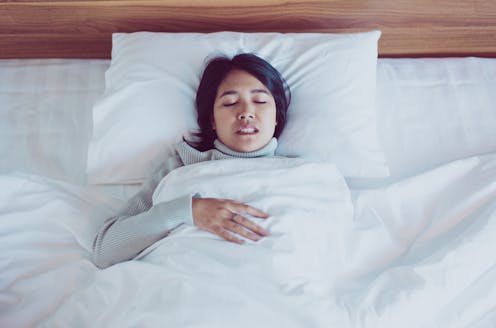Source: The Conversation (Au and NZ) – By Alexander Holden, Clinical Associate Professor, University of Sydney

Shutterstock
Dentists have reported a rise in teeth clenching and grinding since the pandemic began.
The symptoms of teeth clenching and/or grinding (also known as bruxing or parafunction) can include pain in teeth and gums, as well as jaw joints and muscles.
The pain it causes can be debilitating and significantly affect your daily life.
We’re specialist dentists who teach, research and practise in the areas of prosthodontics (Dale Howes) and community dentistry (Alexander Holden). Here’s what you need to know about clenching and grinding your teeth.

Shutterstock
Read more:
Do I really need this crown? Dentists admit feeling pressured to offer unnecessary treatments
Are you clenching your jaw right now?
Our top and bottom teeth are only designed to meet when we need them to; for biting and chewing food.
We naturally spend only a small portion of the day chewing, with our top and bottom teeth making contact with each other.
As you read this article, think about how, subconsciously, you have positioned your teeth and jaws. Assuming you are not eating or chewing while reading, your teeth should be apart when you’re relaxed, whether or not your lips and mouth are shut.
If we grind or clench more than nature intended, the teeth can become worn over time, while the jaw muscles can become fatigued and tight.
The jaw joints (known as the temporomandibular joints) attaching the lower jaw to the skull contain a disc, which helps control the way the jaw joints move.
This disc can become distorted or dislocated, which can lead to clicking, reduce function and cause pain.
So why do we grind our teeth?
Stress is one of the main contributing factors.
When I (Alexander Holden) see patients who complain of soreness in their jaw joints and surrounding muscles, or who have obvious signs of grinding or wear on their teeth, I’ll ask about stress.
“No, I’m not stressed at all!” is often the answer, but then when we sit and talk about what’s really going in their life, the sources of stress quickly become apparent.
Starting a new job, challenges at home or with family, or coping with a life change are all common experiences that stress us more than we realise. It’s not always easy to identify when we’re experiencing tough times.

Shutterstock.
What can we do about it?
The first step is becoming aware you’re grinding and clenching, and making an often subconscious behaviour into one that we can control and stop.
Dental practitioners are trained to check the health and status of the jaw joints and the muscles that help you to chew.
A dental check-up can help reveal the signs of teeth grinding and jaw clenching, which can include cracked teeth and fillings, worn crowns or cusps (which is what the elevated edge of a tooth is called) and tender jaw muscles. Tender muscles around sides of the head and neck are also common.
Stress management and physiotherapy may be important components of a multi-disciplinary approach to care.
If you grind at night (ask your partner), you might wake with sore teeth, jaw joints or head and neck muscles. Chat with your dentist about whether a bite guard (also known as a bite raising appliance or “splint”) might be right for you. These protect your teeth and jaws while you sleep.
For those who have issues with a sore jaw from clenching and grinding, avoid chewing gum for extended periods of time. Chewing sugar-free gum has been linked to reducing risk of tooth decay but for grinders, it can contribute to jaw pain.
Read more:
50 shades whiter: what you should know about teeth whitening
Addressing the cause, managing the symptoms
At the end of the day, patients need to also address the stressors which may be the underlying cause.
For many people, teeth grinding is cyclical and periodically disappears after the source of their stress is managed or subsides.
For others, it might not be so straightforward.
That’s where the advice and care of a dentist can help get you the care you require.
![]()
Associate Professor Alexander Holden is engaged in funded research/evaluation activities for NSW Health and has received research funding from the Australian Skeptics Inc. and the Dental Council of NSW in the recent past. Alexander is also holds Director roles with the Australian Dental Association NSW Branch, Filling the Gap (a charity dedicated to providing care to undeserved community groups) and the Australasian College of Legal Medicine. He holds affiliate appointments as a Clinical Associate Professor with the University of Sydney and as Associate Professor (Status Only) with The University of Toronto Faculty of Dentistry.
Dale Howes does not work for, consult, own shares in or receive funding from any company or organisation that would benefit from this article, and has disclosed no relevant affiliations beyond their academic appointment.
– ref. Why do I grind my teeth and clench my jaw? And what can I do about it? – https://theconversation.com/why-do-i-grind-my-teeth-and-clench-my-jaw-and-what-can-i-do-about-it-172298






